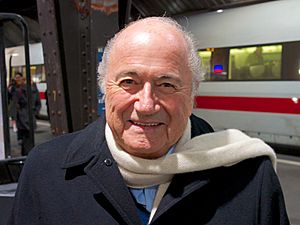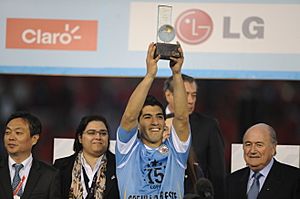Sepp Blatter facts for kids
Quick facts for kids
Sepp Blatter
|
|
|---|---|
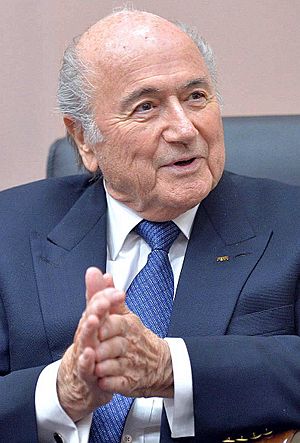
Blatter in April 2015
|
|
| 8th President of FIFA | |
| In office 8 June 1998 – 21 December 2015 |
|
| Preceded by | João Havelange |
| Succeeded by | Issa Hayatou (acting) Gianni Infantino |
| Secretary General of FIFA | |
| In office June 1981 – 8 June 1998 |
|
| Preceded by | Helmut Käser |
| Succeeded by | Michel Zen-Ruffinen |
| Personal details | |
| Born |
Josef Blatter
10 March 1936 Visp, Valais, Switzerland |
| Spouses | Liliane Biner (divorced) Barbara Käser
(m. 1981; died 1991)Graziella Bianca
(m. 2002; div. 2004) |
| Domestic partners | Ilona Boguska (1995–2002) Linda Barras (2014–present) |
| Children | 1 |
| Residences | Zürich, Switzerland |
| Signature | |
Joseph "Sepp" Blatter (born Josef Blatter; 10 March 1936) is a Swiss former football administrator who served as the eighth President of FIFA from 1998 to 2015. He has been banned from participating in FIFA activities since 2015 as a result of the FIFA corruption case made public that year, and will remain banned until 2027.
From a background in business, public relations, and sports administration, Blatter became general secretary of FIFA in 1981 and was then elected president at the 51st FIFA Congress on 8 June 1998, succeeding João Havelange, who had headed the organization since 1974. Blatter was re-elected in 2002, 2007, 2011, and 2015. Like his predecessor Havelange, Blatter built his power base in FIFA by increasing the influence of numerous African and Asian countries in world football through the expansion of participating teams in various FIFA tournaments, culminating in the highly controversial awarding of the 2022 World Cup to Qatar, a Gulf oil state of 3,000,000 with little footballing culture. Under Blatter's leadership as President, eleven of the 22 committee members who voted on the 2018 and 2022 tournaments were fined, suspended, banned for life or prosecuted for corruption, including Blatter. Although he has persistently been dogged by claims of corruption and financial mismanagement, Blatter's reign oversaw a vast expansion in revenues generated by the FIFA World Cup accompanied by the collapse of the marketing company International Sport and Leisure and numerous allegations of corruption in the bidding processes for the awarding of FIFA tournaments.
On 2 June 2015, six days after the United States government indicted several current and former FIFA officials and sports marketing companies for bribery and money laundering, Blatter announced that he would call for elections to choose a new president of FIFA and that he would not stand in these elections, but he also said he would remain in his position until an extraordinary FIFA Congress could be held for his successor to be elected. Criminal proceedings were announced against Blatter by the Swiss Attorney General's office on 25 September 2015, regarding "criminal mismanagement... and misappropriation".
In October 2015, Blatter and other top FIFA officials were suspended amid the investigation, and in December the independent FIFA Ethics Committee ejected Blatter from office and banned him from taking part in any FIFA activities over the following eight years. On 24 February 2016, a FIFA appeals committee upheld the suspension but reduced it from eight years to six. On 24 March 2021, he received a second ban for six years and was fined the amount of CHF 1,000,000 by the body's Ethics Committee after a probe into massive bonus payments. Issa Hayatou served as the acting President of FIFA until an extraordinary FIFA Congress was held in late February, electing Gianni Infantino as the 9th president of FIFA.
Contents
Early life
Blatter was born in Visp in the Swiss canton of Valais with the given name of Josef. He studied in Saint Maurice, before getting a degree in business and economics from the University of Lausanne in 1959. Blatter has had a long and varied career, including posts such as head of public relations for the tourist board of his native canton, as well as general secretary of the Swiss Ice Hockey Federation.
He was Director of Sports Timing and Relations of Longines S.A., and was involved in the organization of the 1972 and 1976 Olympic Games.
FIFA
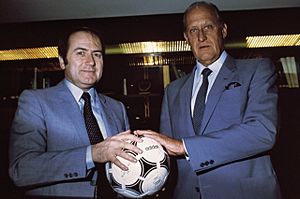
From 1975 onwards, Blatter worked at FIFA, first as technical director (1975–1981), then general secretary (1981–1998), before his election as FIFA president in 1998. He was re-elected as head of FIFA in 2002, and was re-elected unopposed for another four years on 31 May 2007, even though only 66 of 207 FIFA members nominated him.
Blatter and FIFA were often dogged by controversy and allegations of corruption. His tenure saw controversy over allegations of financial mismanagement and the acceptance of bribes resulting in Qatar's successful 2022 World Cup bid.
Blatter has attracted criticism from the media, senior football figures and players, due to controversial statements. He also drew criticism at the 2014 FIFA World Cup seeding, when he interrupted a "one-minute silence" for former South-African president Nelson Mandela, who died the day before, after eleven seconds. Michael van Praag, the chairman of the Royal Dutch Football Association, called his behavior "preposterous" and expressed the hope Blatter would not be reelected in 2015.
Blatter has been publicly heckled, at the World Cup in Seoul and the Confederations Cup in Frankfurt, both in 2002 and 2005, in his home town of Visp in 2011, at the 2012 Women's Olympic Football Final Medal Ceremony, and at the opening of Confederations Cup match in 2013. In order to avoid protest, no speeches were given at the 2014 FIFA World Cup.
1998 election
Sepp Blatter's 1998 election to the presidency of FIFA over UEFA President Lennart Johansson occurred amidst much controversy. Blatter's 2002 candidacy was marked with rumours of financial irregularities and backroom dealings, culminating with direct accusations of bribery, by a third party, made in the British press by Farra Ado, vice-president of the Confederation of African Football and president of the Somali Football Federation, who claimed to have been offered $100,000 to vote for Blatter in 1998.
2004 Sexist comments on women's football
In 2004, Blatter said during an interview in the Swiss newspaper Sonntagsblick, when asked how to increase the popularity of women's football, "Let the women play in more feminine clothes like they do in volleyball. They could, for example, have tighter shorts. Female players are pretty, if you excuse me for saying so, and they already have some different rules to men - such as playing with a lighter ball. That decision was taken to create a more female aesthetic, so why not do it in fashion?" His comments resulted in heated responses.
2006 FIFA World Cup
In the 2006 FIFA World Cup, after a controversial second-round match between Portugal and the Netherlands, which saw referee Valentin Ivanov issue a record 16 yellow cards and four red cards, Blatter was said to have lambasted the officiating referee, and said that Ivanov should have given himself a yellow card for his poor performance as a referee. He later said he regretted his words and promised to officially apologise to Ivanov. The apology was never given, and the referee was removed from further officiating.
Foreign 'over-representation' on club teams
Blatter was criticized in 2007 and 2008 for trying to change European Union employment law regarding the number of foreign players that football clubs could field at any one time. His plans were to set a restriction of five foreign players and having six players from the said team's own nationality. Blatter believed this would help the countries' national sides by having more national players playing in their leagues.
Blatter has often referred to the English Premier League as one of the major problems in football and used it as an example, due to the influence of foreign players, coaches and owners in the top teams.
World Cup's chosen sites
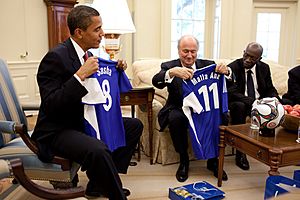
It was reported that Blatter had "cut an unofficial deal with UEFA head Michel Platini" to ensure Europe would receive the 2018 World Cup, such that if the non-European bids did not withdraw from 2018 "they will find themselves frozen out and not given any backing by the FIFA High Command, damaging their chances of being serious contenders for the second tournament."
Eleven bids were submitted in March 2009 covering 13 nations. Mexico and Indonesia withdrew. Five of the remaining nine bids—South Korea, Qatar, Japan, Australia and the United States—were only for the 2022 World Cup, while all the others were bidding for both the 2018 and 2022 World Cups. Because all of the bids for the 2018 World Cup were from European nations, and FIFA's rules dictate that countries belonging to confederations that hosted either of the two preceding tournaments are not eligible to host, the bids of England, Russia, Netherlands/Belgium and Spain/Portugal were forced to be for 2018 only.
Technological assistance
The criticism attracted by Blatter's refusal to allow goal-line technology or video replays intensified following the controversial Frank Lampard disallowed goal in the match between England and Germany on 27 June 2010.
Two days later, Blatter stated that he deplored the "evident referee mistakes" in the England v Germany and Mexico v Argentina matches, and apologised to the English Football Association and the Mexican Football Federation (the two organizations directly concerned by the referees' mistakes), acknowledging that Lampard had indeed scored against Germany and that Tévez's goal against Mexico had been scored from an offside position.
He added: "It is obvious that after the experiences so far at this World Cup it would be a nonsense not to re-open the file on goal-line technology. […] We will come out with a new model in November on how to improve high level referees. […] I cannot disclose more of what we are doing but something has to be changed."
2011 FIFA presidential election
In 2011, elections were scheduled for the FIFA presidency, in which Blatter was again the incumbent candidate, running for a fourth consecutive term. The ChangeFIFA organisation, on 29 March 2011, endorsed former Chilean defender and for three years running South American Footballer of the Year Elías Figueroa as candidate for the presidency, urging national federations to nominate him, but, subsequently, Figueroa decided not to accept the nomination, stating that "in such a short period of time" he could not develop a case "worthy of the magnitude and importance of such a distinguished job"
The vote took place at the 61st FIFA Congress in Zurich. The only other candidate, Mohammed bin Hammam of Qatar, withdrew from the presidential race on 28 May, just before the vote. Bin Hammam had supported Blatter's 1998 and 2002 presidential campaigns, but admitted that he had fallen out with Blatter over issues within the FIFA Executive Committee. The FIFA ethics committee that investigated bribery claims against Bin Hammam and CONCACAF head Jack Warner announced that Blatter will not face an investigation into claims that he knew of the bribery and did nothing about it, because of a lack of evidence.
Blatter criticised the International Olympic Committee (IOC), stating FIFA manage their finances "like a housewife", after the IOC announced it would look into allegations of corruption against Issa Hayatou, president of the Confederation of African Football.
There being no other nominations, Blatter ran unopposed in the ensuing presidential election and was re-elected for a fourth term, with 186 of the 203 votes cast. In his campaign, Blatter had stipulated that, if re-elected in 2011, he would not run again for president. Blatter received criticism for not postponing his 2011 election in which his term as FIFA President was extended through 2015, despite the fact that all other candidates for the role had been suspended or withdrew.
Allegations of financial mismanagement
Amidst internal divisions, FIFA's secretary-general Blatter's deputy and former protégé Michel Zen-Ruffinen drew up a 30-page dossier outlining allegations of financial mismanagement within the organisation. The dossier alleged that the collapse of FIFA's marketing partner ISL had led to losses of up to $US100 million under Blatter's management.
The allegations were backed by Johansson, and the dossier was handed to the Swiss authorities, but they cleared Blatter of any wrongdoing and FIFA had to pay all the costs. An internal investigation within FIFA was halted by Blatter because members of it broke confidentiality agreements. This questionable behaviour led him to remove Zen-Ruffinen from office immediately before the 2002 FIFA World Cup.
In April 2012 the Council of Europe published a report which stated it would be "difficult to imagine" that Blatter would have been unaware of "significant sums" paid to unnamed FIFA officials by ISSM/ISL in connection with lucrative contracts for World Cup television rights and the subsequent bankruptcy and collapse of ISL in 2001. The Council of Europe report will be considered by over 300 parliamentarians from the 47 Council of Europe member states in Strasbourg.
2013 FIFA Ethics Committee investigation
On 29 April 2013, FIFA's Ethics Committee concluded its investigation into allegations of illegal payments to FIFA officials from the organisation's former marketing partner International Sports and Leisure (ISL), which went bankrupt in 2001, and published its report.
FIFA president Sepp Blatter was cleared of any misconduct, but his predecessor, Brazilian João Havelange, resigned as FIFA's honorary president over his part in the scandal, since Havelange along with former FIFA Executive Committee members Ricardo Teixeira and Dr. Nicolás Leoz were found to have accepted illegal payments between 1992 and May 2000. A week before FIFA's ethics committee announced its findings, 84-year-old Leoz had resigned from his post as president of the South American Football Confederation, citing "health reasons".
Blatter, in a statement, "note[d] with satisfaction" that the report "confirms that 'President Blatter's conduct could not be classified in any way as misconduct with regard to any ethics rules'." He added he has "no doubt that FIFA, thanks to the governance reform process that [Blatter] proposed now has the mechanisms and means to ensure that such an issue does not happen again", though admitting that the scandal "has caused untold damage to the reputation of [FIFA]."
Honours
Blatter has been the recipient of numerous awards, medals, honorary degrees, and citizenships from nation states, sport governing bodies, special interest groups, universities, and cities.
Blatter’s honorary degree from De Montfort University was revoked by the institution in October 2015, as it had previously been given in recognition of his ethical conduct.
Personal life
In 1981, Blatter changed the spelling of his first name from Josef to Joseph. He later adopted his nickname, Sepp, as his middle name.
Blatter's first wife was Liliane Biner. The couple had a daughter, Corinne, and divorced shortly after. In 1981, Blatter married Barbara Käser, the daughter of Helmut Käser, Blatter's predecessor as secretary general of FIFA. Their marriage lasted ten years until Barbara died from complications after an operation. In 1995, Blatter began dating Ilona Boguska, a Polish friend of his daughter Corinne, before they separated in 2002.
Blatter married for a third time on 23 December 2002, to Graziella Bianca, a dolphin trainer who was a friend of his daughter. Their marriage ended in divorce in 2004. Since 2014, he has been in a domestic partnership with Linda Barras.
Blatter was raised as a Catholic.
See also
 In Spanish: Joseph Blatter para niños
In Spanish: Joseph Blatter para niños
- United Passions, a 2014 film starring Tim Roth as Blatter


